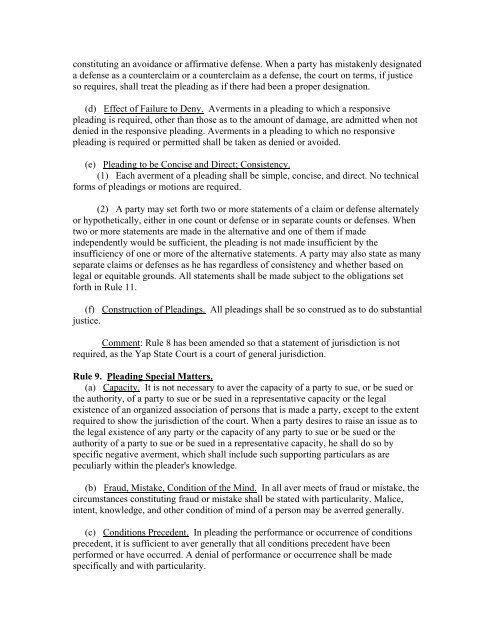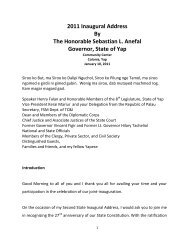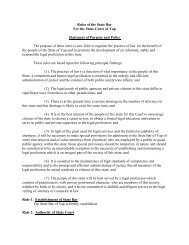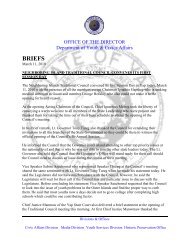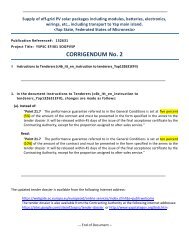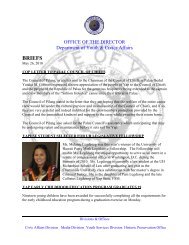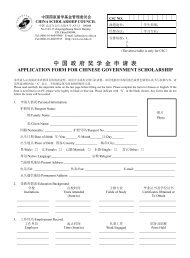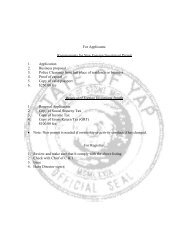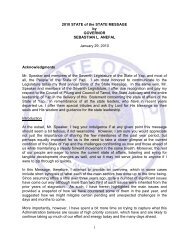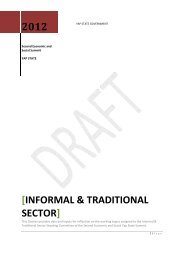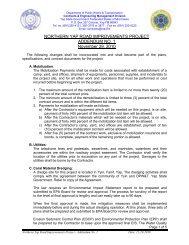RULES OF CIVIL PROCEDURE For the Trial Division of the Yap ...
RULES OF CIVIL PROCEDURE For the Trial Division of the Yap ...
RULES OF CIVIL PROCEDURE For the Trial Division of the Yap ...
Create successful ePaper yourself
Turn your PDF publications into a flip-book with our unique Google optimized e-Paper software.
constituting an avoidance or affirmative defense. When a party has mistakenly designated<br />
a defense as a counterclaim or a counterclaim as a defense, <strong>the</strong> court on terms, if justice<br />
so requires, shall treat <strong>the</strong> pleading as if <strong>the</strong>re had been a proper designation.<br />
(d) Effect <strong>of</strong> Failure to Deny. Averments in a pleading to which a responsive<br />
pleading is required, o<strong>the</strong>r than those as to <strong>the</strong> amount <strong>of</strong> damage, are admitted when not<br />
denied in <strong>the</strong> responsive pleading. Averments in a pleading to which no responsive<br />
pleading is required or permitted shall be taken as denied or avoided.<br />
(e) Pleading to be Concise and Direct; Consistency.<br />
(1) Each averment <strong>of</strong> a pleading shall be simple, concise, and direct. No technical<br />
forms <strong>of</strong> pleadings or motions are required.<br />
(2) A party may set forth two or more statements <strong>of</strong> a claim or defense alternately<br />
or hypo<strong>the</strong>tically, ei<strong>the</strong>r in one count or defense or in separate counts or defenses. When<br />
two or more statements are made in <strong>the</strong> alternative and one <strong>of</strong> <strong>the</strong>m if made<br />
independently would be sufficient, <strong>the</strong> pleading is not made insufficient by <strong>the</strong><br />
insufficiency <strong>of</strong> one or more <strong>of</strong> <strong>the</strong> alternative statements. A party may also state as many<br />
separate claims or defenses as he has regardless <strong>of</strong> consistency and whe<strong>the</strong>r based on<br />
legal or equitable grounds. All statements shall be made subject to <strong>the</strong> obligations set<br />
forth in Rule 11.<br />
(f) Construction <strong>of</strong> Pleadings. All pleadings shall be so construed as to do substantial<br />
justice.<br />
Comment: Rule 8 has been amended so that a statement <strong>of</strong> jurisdiction is not<br />
required, as <strong>the</strong> <strong>Yap</strong> State Court is a court <strong>of</strong> general jurisdiction.<br />
Rule 9. Pleading Special Matters.<br />
(a) Capacity. It is not necessary to aver <strong>the</strong> capacity <strong>of</strong> a party to sue, or be sued or<br />
<strong>the</strong> authority, <strong>of</strong> a party to sue or be sued in a representative capacity or <strong>the</strong> legal<br />
existence <strong>of</strong> an organized association <strong>of</strong> persons that is made a party, except to <strong>the</strong> extent<br />
required to show <strong>the</strong> jurisdiction <strong>of</strong> <strong>the</strong> court. When a party desires to raise an issue as to<br />
<strong>the</strong> legal existence <strong>of</strong> any party or <strong>the</strong> capacity <strong>of</strong> any party to sue or be sued or <strong>the</strong><br />
authority <strong>of</strong> a party to sue or be sued in a representative capacity, he shall do so by<br />
specific negative averment, which shall include such supporting particulars as are<br />
peculiarly within <strong>the</strong> pleader's knowledge.<br />
(b) Fraud, Mistake, Condition <strong>of</strong> <strong>the</strong> Mind. In all aver meets <strong>of</strong> fraud or mistake, <strong>the</strong><br />
circumstances constituting fraud or mistake shall be stated with particularity. Malice,<br />
intent, knowledge, and o<strong>the</strong>r condition <strong>of</strong> mind <strong>of</strong> a person may be averred generally.<br />
(c) Conditions Precedent. In pleading <strong>the</strong> performance or occurrence <strong>of</strong> conditions<br />
precedent, it is sufficient to aver generally that all conditions precedent have been<br />
performed or have occurred. A denial <strong>of</strong> performance or occurrence shall be made<br />
specifically and with particularity.


